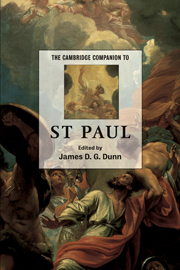2 - Paul as missionary and pastor
from Part I - Paul’s life and work
Published online by Cambridge University Press: 28 May 2006
Summary
STARTING POINT: APOSTLE TO THE GENTILES
The foundation of Paul's thought and practice as a missionary and pastor was a life-changing experience of revelation experienced as grace and call. He gives his most direct account in Gal. 1:11-16:
For I would have you know, brethren, that the gospel which was preached by me is not man's gospel. 'For I did not receive it from man, nor was I taught it, but it came through a revelation of Jesus Christ. For you have heard of my former life in Judaism, how I persecuted the church of God violently and tried to destroy it; and I advanced in Judaism beyond many of my own age among my people, so extremely zealous was I for the traditions of my fathers. But when he who had set me apart before I was born, and had called me through his grace, was pleased to reveal his Son to [literally, 'in'] me, in order that I might preach him among the Gentiles, I did not confer with flesh and blood.
This first-person testimony is extremely important. It shows us, first, that for Paul the starting point of his Christian self-understanding was a divine gift in the form of a revelation to/in him of Jesus Christ risen from the dead and exalted in glory at God’s right hand as his Son (cf. Rom. 1:4; 2 Cor. 3:16–18). Second, Jesus Christ as God’s Son risen from the dead is represented by Paul as the ‘gospel’ (euaggelion), and intrinsic to the gospel is that it is a message to be preached (euaggelizesthai).
- Type
- Chapter
- Information
- The Cambridge Companion to St Paul , pp. 34 - 48Publisher: Cambridge University PressPrint publication year: 2003
- 1
- Cited by



